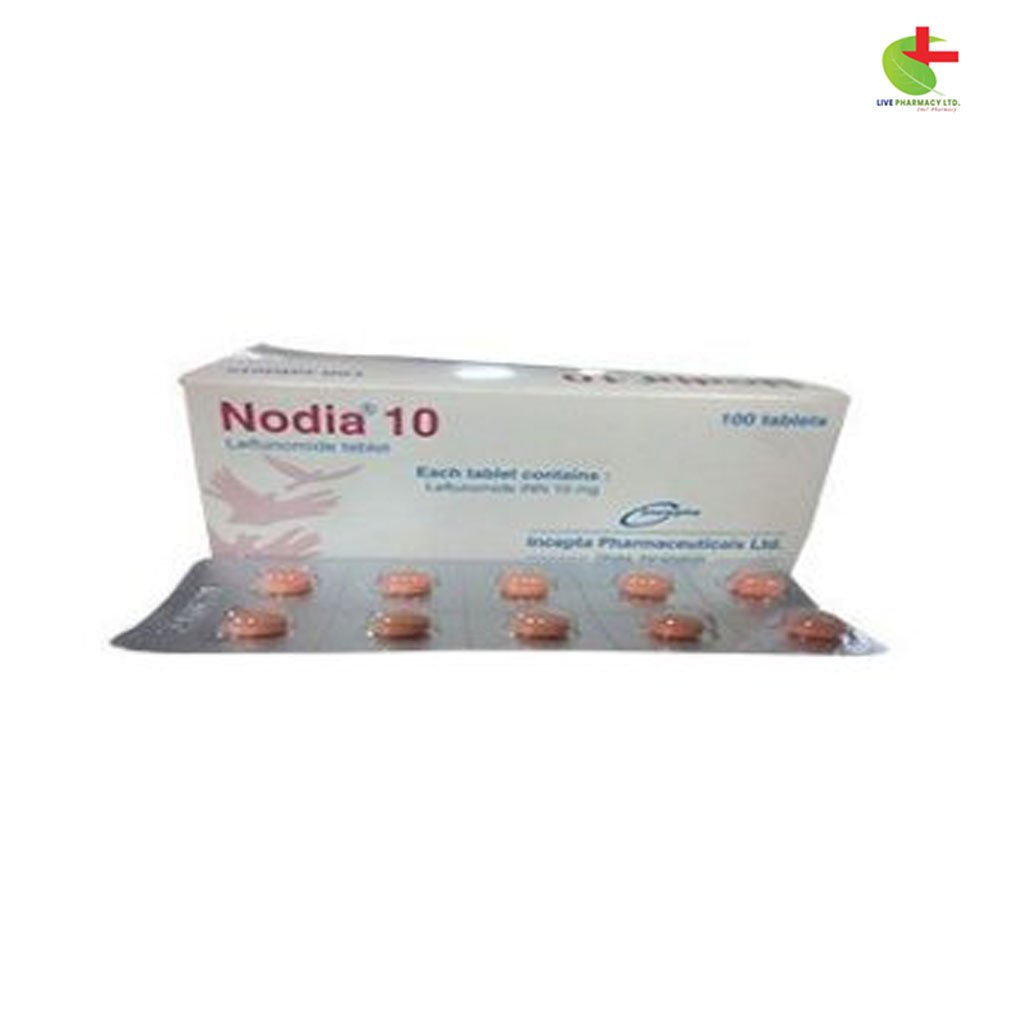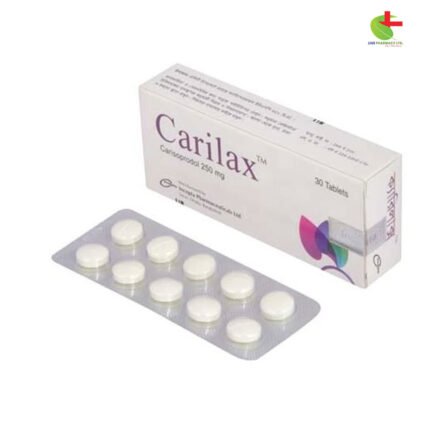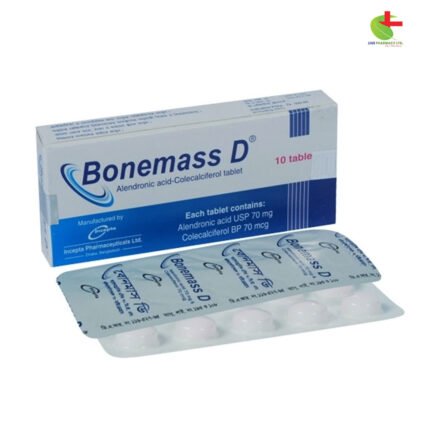Nodia 10
30.00৳ Strip(10)
- Nodia is an effective treatment for active rheumatoid arthritis (RA) in adults, helping to reduce symptoms and prevent joint damage.
- It works by inhibiting pyrimidine synthesis in activated T cells, slowing disease progression.
- The medication is taken once daily, starting with a 100 mg loading dose, followed by a 20 mg maintenance dose.
- Nodia can have side effects such as gastrointestinal discomfort, elevated liver enzymes, and alopecia.
 Brand
Brand
|
Incepta Pharmaceuticals Ltd |
|---|---|
 Generics
Generics
|
Leflunomide |
 Type
Type
|
Tablet |
Indications
Nodia is prescribed for adults to treat active rheumatoid arthritis (RA). It helps reduce the signs and symptoms of RA and slows down the progression of structural damage, such as joint erosion and narrowing of joint spaces as observed through X-ray.
Note: Always follow the advice of a registered healthcare professional before using this medication.
Description
Nodia is a pyrimidine synthesis inhibitor indicated for the treatment of active rheumatoid arthritis in adults. RA is an autoimmune disorder characterized by excessive T-cell activity. T lymphocytes utilize two main pathways for pyrimidine synthesis: the salvage pathway and de novo synthesis. While resting T cells use the salvage pathway to meet metabolic needs, activated T cells require an expanded pool of pyrimidines. They rely on the de novo pathway to produce the increased amounts of pyrimidines. Nodia effectively targets the dihydroorotate dehydrogenase enzyme in these activated T cells, inhibiting the de novo pyrimidine synthesis, and thereby influencing the disease process in rheumatoid arthritis.
Pharmacology
Leflunomide, the active ingredient in Nodia, is an immunomodulatory isoxazole derivative that inhibits de novo pyrimidine synthesis and has anti-proliferative effects. Once ingested, leflunomide is rapidly metabolized into A771726, which is the pharmacologically active form in the body. In preclinical models, leflunomide has shown both therapeutic and prophylactic effects for autoimmune diseases. It also demonstrates anti-inflammatory properties, along with mild analgesic and antipyretic effects. However, in animal models of septicemia, leflunomide did not affect the resistance to bacterial infections.
Dosage & Administration
For rheumatoid arthritis, Nodia should be taken once daily. The recommended initial dose is 100 mg per day for the first 3 days (loading dose), followed by a maintenance dose of 20 mg once daily. This medication does not require a gradual dose escalation. If there are concerns regarding side effects, the dose can be reduced to 10 mg per day.
Important Note: Always take the medication as prescribed by a registered healthcare professional.
Drug Interactions
- Cholestyramine and activated charcoal may reduce the plasma concentration of the active metabolite.
- The concurrent use of methotrexate and other hepatotoxic drugs can increase the risk of liver damage.
- Rifampicin may raise the serum levels of the active metabolite.
Contraindications
Nodia should not be used by individuals who:
- Are hypersensitive to leflunomide or any of its components.
- Have hepatic impairment or severe uncontrolled infections.
- Have bone marrow dysplasia.
Side Effects
Some common side effects of Nodia include:
- Diarrhea, nausea, vomiting, abdominal discomfort
- Headache, respiratory infections, bronchitis
- Elevated liver enzymes, worsening of pre-existing hypertension
- Hair loss (alopecia) and skin rashes
Pregnancy & Lactation
Nodia is not recommended during pregnancy. Women should avoid pregnancy while taking leflunomide and until the drug is fully cleared from the system. It should also not be used by breastfeeding mothers due to the unknown risk of the drug being excreted in breast milk. A careful decision should be made, weighing the importance of the medication for the mother against potential risks to the infant.
Precautions & Warnings
- Women of childbearing potential should use reliable contraception during treatment and for a period after therapy ends.
- Caution is advised in patients with renal insufficiency.
- Regular liver function monitoring is necessary before starting treatment.
Overdose Effects
There are no documented cases of overdose in humans. In case of significant overdose, the use of cholestyramine or activated charcoal is recommended to accelerate the elimination of the drug from the body.
Therapeutic Class
Medications for Rheumatoid Arthritis.
Storage Conditions
Store Nodia below 30°C, away from light and moisture. Keep out of reach of children.













Reviews
There are no reviews yet.